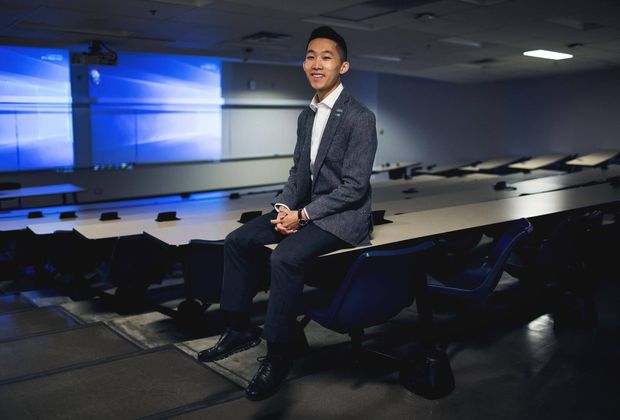Since as long as I could remember, I’ve been trying to find “the right way to live”.
Intelligence
First I thought that being smarter than everyone was the right way to live.
In 9th grade, I had extremely-high standards for other people’s work. A girl in my high school business tech course put flowers on her Powerpoint. I immediately raised my hand and asked “why are there flowers on it?”
I thought a business presentation was supposed to be all black and white headers and Times New Roman fonts, so when her presentation didn’t mean my criteria, I shot it down.
I didn’t have any empathy for her creativity or any concern for her motivations.
When people shot down my work, I got frustrated — but often I didn’t even recognize when people were giving me criticism. Even when I got a mark below my average, I rationalized it to myself by telling myself that I’m too smart and that my teachers don’t understand. I didn’t make an effort to figure out why I got the mark that I did.
Pursuing intelligence as a value prevented me from learning and from communicating.
Accomplishment
After graduating from high school, I saw an opportunity to take action rather than just sit in class. So, I took action. But not in a clear, focused, organized way — I took on every opportunity as soon as I saw it.
Again, I knew that accomplishment felt good and that there was a lot of it out there. There was no meaning in that — simply reward.
I don’t mean to say that the experiences weren’t rewarding. Running events, taking on volunteer positions, and working 30-40 hours per week had its fair share of meaning, but after each one ended all I could think about was “what am I doing next?” I never stopped to think “am I doing the right thing for myself?”
By taking on so many projects and saying yes to everything that came my way, I eventually either broke down or just put out bad work.
Pursuing accomplishment filled up my resume and left me with a caffeine overdose, memory loss, and an average of 4 hours of sleep per day.
It wasn’t sustainable.
Honesty
Only after stopping to look at my life openly and honestly did I realize that I needed to find something that I enjoy and pursue it rather than going after things like intelligence and accomplishment — the results of passion.
This was difficult — very difficult.
Forcing change in yourself is probably the hardest thing anyone can do. Good books, music, and film are all about great change — and the accomplishment and insight that arises from it.
Honestly, I fumbled. I was in a business tech program with no complete focus on any industry. The skills taught to me are so broad that I can apply them anywhere. It’s a gift and a curse.
This was also around the time I started picking out a career.
“Consulting”, I thought — something as broad and ambiguous as me.
But consulting isn’t broad or ambiguous. Consulting is a clear set of principles and processes and needs expertise in a specific area, be it business, technology, or underwater basket-weaving.
I had some business experience from classes which I couldn’t clearly articulate and I had a lot of design and marketing experience which I — again — couldn’t articulate.
It wasn’t even articulating that was the problem — I wasn’t even aware of my experience.
I was so sure that consulting was what I wanted to do that whenever I spoke to a recruiter or a consultant and they mentioned something I didn’t immediately have, I panicked.
That’s not to say I didn’t do my homework — I aligned my internship course to perform consulting duties for an Augmented Reality company and started a consulting project with a professor.
Eventually I found that — even if I called myself a consultant and could do consulting — it wasn’t sustainable for me. Even the companies that hire consultants (Deloitte, IBM, Accenture, etc.) they look for people with other experience. Consulting takes backseat to the skills they know to provide the service.
I didn’t have those skills yet.
In my last semester of university, I took a data journalism writing course.
I have a minor in professional writing and after having miscounted my credits in the previous summer, I needed 2 writing courses to graduate — this was one of them.
I didn’t really know what to think of it. Other students told me it was a good course — and I was open to learning more about it.
I didn’t give the course the attention it deserved, but it ended up inspiring me the most — I started thinking about the world in numbers and finding data relationships and sources everywhere.
That, in turn led to me running a data project at the Career Centre and writing these blogs and being mentored by Zane and David to learn more about myself and how I can build my career in data.
Change
So why am I talking about all of this?
Because the right way to live isn’t through intelligence or accomplishment — and it starts with honesty; the right way to live is through change. Being able to adapt yourself from person to person, from situation to situation, from role to role, and from market to market — that is the way to succeed. And being honest about yourself, those around you, and about your situation allows you to control how you change to a greater degree.
This week Zane sent me a piece about “talent marketing” — understanding how your understandings, skills, and attributes fit into your chosen career market. The piece also talked a little bit about how students start branding themselves before they understand themselves and their market — that’s a little bit like me trying to succeed based on intelligence or accomplishment without asking “why” or “towards what goal”?
Zane also asked me how the way I market myself will be different with startups compared to other companies… Startups are less formal — there’s more of a focus on the person and the passion than there is on the bottom line or arbitrary hierarchy. Don’t misunderstand — both the bottom line and hierarchy are important, but startups don’t let the 2 hinder collaboration. There’s also an emphasis on passion and being able to run with ideas without having to go through administrative processes.
And it’s not that I won’t go through a formal process, but I feel like I’m more likely to find a startup job at a bar or a lounge rather than a career fair.
Either way, as long as I’m open and honest about what I want and I keep trying and focusing on myself and my market, all of those differences will eventually become clear.
Because change is the great deceiver. Even when you’re aware of it and try and direct it, you won’t notice it until you sit down and look back at a time where you weren’t yourself.




